中西方文化差异-英文版1
- 格式:ppt
- 大小:3.43 MB
- 文档页数:29
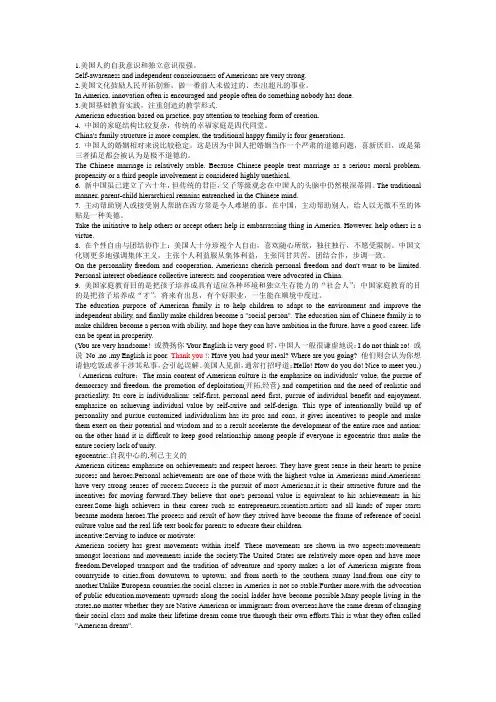
1.美国人的自我意识和独立意识很强。
Self-awareness and independent consciousness of Americans are very strong.2.美国文化鼓励人民开拓创新,做一番前人未做过的、杰出超凡的事业。
In America, innovation often is encouraged and people often do something nobody has done.3.美国基础教育实践,注重创造的教学形式.American education based on practice, pay attention to teaching form of creation.4. 中国的家庭结构比较复杂,传统的幸福家庭是四代同堂。
China's family structure is more complex, the traditional happy family is four generations.5. 中国人的婚姻相对来说比较稳定。
这是因为中国人把婚姻当作一个严肃的道德问题,喜新厌旧,或是第三者插足都会被认为是极不道德的。
The Chinese marriage is relatively stable. Because Chinese people treat marriage as a serious moral problem, propensity or a third people involvement is considered highly unethical.6. 新中国虽已建立了六十年,但传统的君臣,父子等级观念在中国人的头脑中仍然根深蒂固。
The traditional manner, parent-child hierarchical remains entrenched in the Chinese mind.7. 主动帮助别人或接受别人帮助在西方常是令人难堪的事。
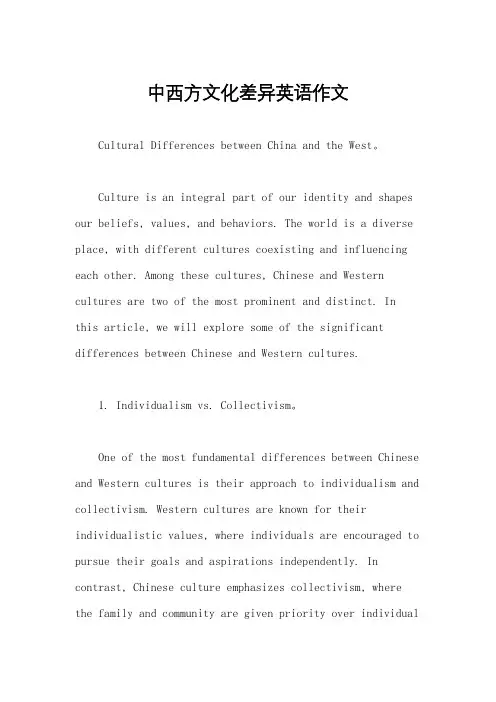
中西方文化差异英语作文Cultural Differences between China and the West。
Culture is an integral part of our identity and shapes our beliefs, values, and behaviors. The world is a diverse place, with different cultures coexisting and influencing each other. Among these cultures, Chinese and Western cultures are two of the most prominent and distinct. Inthis article, we will explore some of the significant differences between Chinese and Western cultures.1. Individualism vs. Collectivism。
One of the most fundamental differences between Chinese and Western cultures is their approach to individualism and collectivism. Western cultures are known for their individualistic values, where individuals are encouraged to pursue their goals and aspirations independently. In contrast, Chinese culture emphasizes collectivism, where the family and community are given priority over individualneeds and desires.2. Communication Styles。
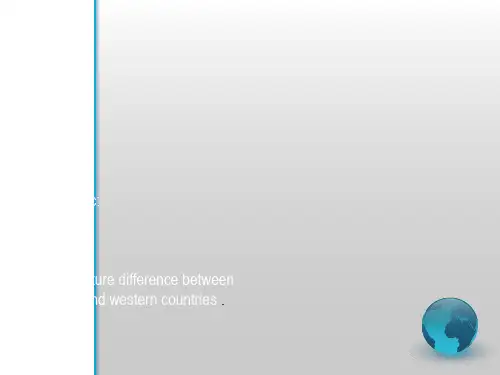
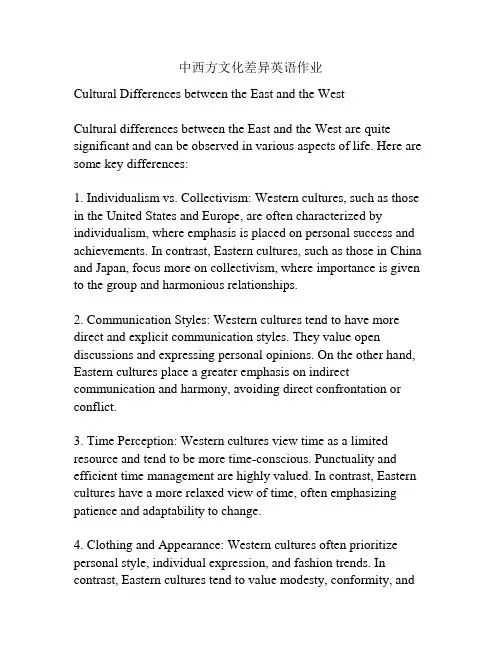
中西方文化差异英语作业Cultural Differences between the East and the WestCultural differences between the East and the West are quite significant and can be observed in various aspects of life. Here are some key differences:1. Individualism vs. Collectivism: Western cultures, such as those in the United States and Europe, are often characterized by individualism, where emphasis is placed on personal success and achievements. In contrast, Eastern cultures, such as those in China and Japan, focus more on collectivism, where importance is given to the group and harmonious relationships.2. Communication Styles: Western cultures tend to have more direct and explicit communication styles. They value open discussions and expressing personal opinions. On the other hand, Eastern cultures place a greater emphasis on indirect communication and harmony, avoiding direct confrontation or conflict.3. Time Perception: Western cultures view time as a limited resource and tend to be more time-conscious. Punctuality and efficient time management are highly valued. In contrast, Eastern cultures have a more relaxed view of time, often emphasizing patience and adaptability to change.4. Clothing and Appearance: Western cultures often prioritize personal style, individual expression, and fashion trends. In contrast, Eastern cultures tend to value modesty, conformity, andtraditional attire.5. Religion and Spirituality: Western cultures are often influenced by Christianity, which emphasizes the belief in one God and individual faith. In contrast, Eastern cultures, such as those influenced by Buddhism, Hinduism, or Confucianism, have a more diverse range of religious beliefs and practices.6. Education Systems: Western education systems typically focus on encouraging critical thinking, creativity, and independent learning. In many Eastern cultures, education emphasizes respect for authority, rote memorization, and conformity to societal norms.7. Food and Dining Etiquette: Western cultures often have more varied and individualistic eating habits, with an emphasis on individual portions and diverse cuisines. In contrast, Eastern cultures often value communal dining experiences, where food is shared and the focus is on harmony and balance in flavors.8. Personal Space and Touch: Western cultures tend to value personal space and may consider physical touch as an invasion of privacy. In contrast, Eastern cultures often have a more relaxed view of personal space and may embrace physical touch as a sign of closeness and connection.It's important to note that these differences are generalizations, and individual cultures and societies within each region may have unique variations. Understanding and appreciating cultural differences can promote cross-cultural understanding and communication.。



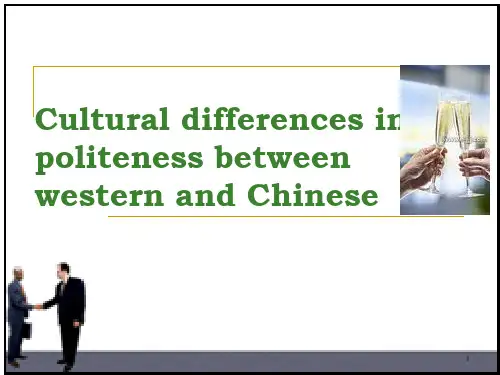
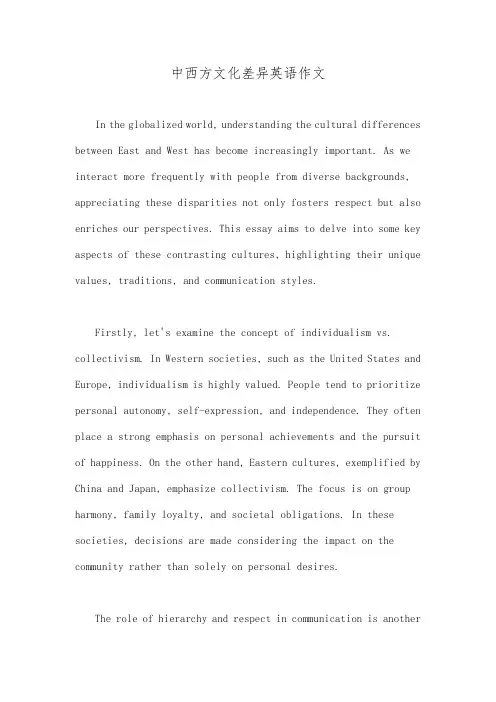
中西方文化差异英语作文In the globalized world, understanding the cultural differences between East and West has become increasingly important. As we interact more frequently with people from diverse backgrounds, appreciating these disparities not only fosters respect but also enriches our perspectives. This essay aims to delve into some key aspects of these contrasting cultures, highlighting their unique values, traditions, and communication styles.Firstly, let's examine the concept of individualism vs. collectivism. In Western societies, such as the United States and Europe, individualism is highly valued. People tend to prioritize personal autonomy, self-expression, and independence. They often place a strong emphasis on personal achievements and the pursuit of happiness. On the other hand, Eastern cultures, exemplified by China and Japan, emphasize collectivism. The focus is on group harmony, family loyalty, and societal obligations. In these societies, decisions are made considering the impact on the community rather than solely on personal desires.The role of hierarchy and respect in communication is anotherstark contrast. In the West, directness is often seen as a sign of honesty and efficiency. Punctuality is highly regarded, and people expect clear, concise communication. In contrast, Eastern cultures, like those in Asia, tend to be more indirect and place great importance on maintaining face and avoiding conflict. Politeness and谦虚 are valued, with subordinates addressing seniors with formal titles or honorifics.The approach to time is another significant difference. Western societies generally operate on a schedule, valuing punctuality and efficiency. They have a strong work ethic, and deadlines are taken seriously. Conversely, many Eastern cultures have a more relaxed attitude towards time, allowing for flexibility and a preference for balance between work and leisure.Family structures also vary significantly. In Western cultures, nuclear families are predominant, with children often leaving home after adolescence to pursue their own lives. In contrast, extended family systems are common in many Eastern societies, wheremulti-generational living and intergenerational support are deeply ingrained.Food culture is another aspect that showcases the diversity. Western cuisine often emphasizes portion sizes and individual choices, while Eastern cuisine tends to focus on communal dining and sharing dishes. Meals are not just about sustenance but also an opportunity for social bonding.Lastly, the education system reflects these cultural differences. Western schools often promote critical thinking, creativity, and independence, whereas Eastern systems might emphasize rote learning and exam-oriented approaches to prepare students for competitive environments.In conclusion, the cultural differences between East and West extend far beyond these examples. They influence every aspect of daily life, from communication styles to societal norms. Recognizing these disparities can lead to better cross-cultural understanding, effective communication, and a more harmonious global community. As we continue to interact with people from different parts of the world, it is crucial to embrace these differences and learn from them.中文翻译:标题:东西方文化的差异:一个比较分析在全球化的世界中,理解东西方文化的差异变得尤为重要。
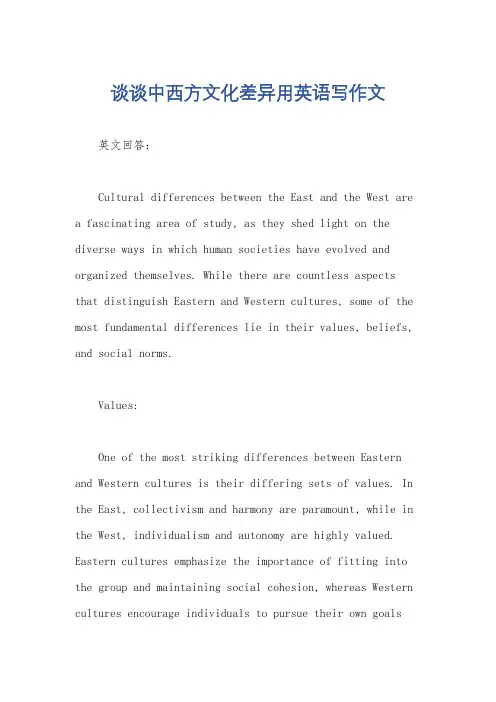
谈谈中西方文化差异用英语写作文英文回答:Cultural differences between the East and the West are a fascinating area of study, as they shed light on the diverse ways in which human societies have evolved and organized themselves. While there are countless aspects that distinguish Eastern and Western cultures, some of the most fundamental differences lie in their values, beliefs, and social norms.Values:One of the most striking differences between Eastern and Western cultures is their differing sets of values. In the East, collectivism and harmony are paramount, while in the West, individualism and autonomy are highly valued. Eastern cultures emphasize the importance of fitting into the group and maintaining social cohesion, whereas Western cultures encourage individuals to pursue their own goalsand desires.Beliefs:Another fundamental difference lies in the religious beliefs and spiritual practices that prevail in each region. Eastern cultures are heavily influenced by Easternreligions such as Buddhism, Confucianism, and Taoism, which emphasize concepts of karma, reincarnation, and the interconnectedness of all things. Western cultures, on the other hand, are rooted in the Judeo-Christian tradition, which places a strong emphasis on monotheism, personal salvation, and the separation between humans and God.Social Norms:The social norms and customs that shape daily life in Eastern and Western cultures also differ significantly. In the East, there is a strong emphasis on respect for authority, hierarchy, and tradition. Individuals are expected to conform to social expectations and avoidcausing shame to their family or community. In the West,social norms are more egalitarian, and individuals are encouraged to question authority and express their own viewpoints.Communication:Communication styles also vary between Eastern and Western cultures. In the East, communication tends to be indirect and implicit, with a focus on non-verbal cues and subtle hints. In the West, communication is often more direct and explicit, with a strong emphasis on clarity and efficiency.Time Perception:Another notable difference is in the way that Eastern and Western cultures perceive time. Eastern cultures tend to view time as cyclical and fluid, while Western cultures view it as linear and finite. This difference can manifest in various aspects of life, such as attitudes toward work, leisure, and personal relationships.These are just a few examples of the countless cultural differences that exist between the East and the West. These differences shape everything from the way that people interact with each other to the way that they view theworld around them. Recognizing and understanding these differences is crucial for fostering mutual respect and cooperation between cultures.中文回答:文化差异。
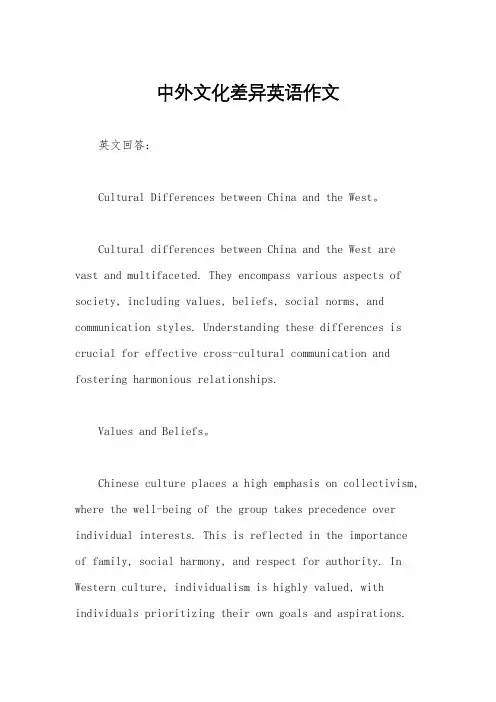
中外文化差异英语作文英文回答:Cultural Differences between China and the West。
Cultural differences between China and the West are vast and multifaceted. They encompass various aspects of society, including values, beliefs, social norms, and communication styles. Understanding these differences is crucial for effective cross-cultural communication and fostering harmonious relationships.Values and Beliefs。
Chinese culture places a high emphasis on collectivism, where the well-being of the group takes precedence over individual interests. This is reflected in the importance of family, social harmony, and respect for authority. In Western culture, individualism is highly valued, with individuals prioritizing their own goals and aspirations.Social Norms。
Social norms in China often emphasize modesty, politeness, and restraint. Individuals are expected to be humble, avoid drawing attention to themselves, and maintain a harmonious social environment. In Western cultures, self-expression, assertiveness, and directness are more common.Communication Styles。
中西方文化差异英语作文英文回答:Cultural differences between China and the West are vast and complex, encompassing various aspects of society, from communication styles to social norms and values. These differences can be attributed to diverse geographical, historical, and philosophical backgrounds that have shaped the two civilizations. Understanding these differences is crucial for fostering mutual respect, effective communication, and successful cross-cultural interactions.Communication Styles:One of the most apparent differences between Chinese and Western cultures lies in their communication styles. In Western cultures, individuals tend to be more direct and explicit in their speech, preferring open and confrontational discussions. Chinese communication, on the other hand, emphasizes indirectness, politeness, andharmony. Chinese speakers often use euphemisms, subtle gestures, and implicit meanings to convey messages.Social Norms and Values:Social norms and values also exhibit significant variations between the two cultures. Western societies prioritize individualism and personal autonomy, encouraging people to express their opinions freely and pursue their own ambitions. In contrast, Chinese culture emphasizes collectivism and social harmony, valuing conformity, respect for authority, and the preservation of relationships.Hierarchy and Power Structures:Hierarchical structures and power dynamics differ markedly in Chinese and Western cultures. Western societies tend to adopt a more egalitarian approach, whereindividuals are generally treated as equals and have equal rights and opportunities. In Chinese culture, hierarchy plays a more prominent role, with clear distinctionsbetween superiors and subordinates in both social and professional settings.Time Perception and Punctuality:Time perception and punctuality are other areas where cultural differences manifest. Western cultures place a high value on timeliness and punctuality, adhering tostrict schedules and viewing time as a linear progression. Chinese culture, on the other hand, often perceives time as fluid and cyclical, with a greater emphasis on flexibility and adaptability rather than strict adherence to schedules.Religion and Spirituality:Religion and spirituality also contribute to cultural differences. Western cultures have been predominantly influenced by Christianity, which emphasizes the importance of individual faith, salvation, and a direct relationship with God. Chinese culture, on the other hand, is characterized by a blend of indigenous beliefs, Buddhism, Confucianism, and Taoism, which promote a holistic view ofthe world, harmony with nature, and ancestral reverence.Food and Dining Customs:Food and dining customs reflect cultural differences as well. Western dining etiquette typically involvesindividual meals eaten using utensils at a table, with an emphasis on portion control and table manners. Chinese dining customs, in contrast, often emphasize communal dining, with food shared among multiple individuals using chopsticks. Food is often served in large portions, and there is a greater emphasis on variety and flavor.中文回答:中西方文化差异。
中外文化差异的英语作文带翻译篇一:中西方文化差异英语作文In my view, it is not surprising that Mr. Jones and Mr. Wang had a so unpleasant conversation, because it caused by the different culture between East and West.Modesty is one of the national characters of Chinese people, which can be proved by those stories about modesty in the history of China. When praised in public, the Chinese may deny it to show the modesty, though he is happy to hear that. However, the Westerner may just say “thank you”to express happiness.If I were Mr. Wang, I would say “Thank you for your praise, and I will keep working hard to do better”. As far as I am concerned, excessive modesty is just hubris, so we should receive the praise with happiness and do better.If I were the boss, I would study the different culture more to understand the staff. As the old saying goes, do in Rome as Rome does. So only if the boss know the difference in the culture and do the right things, can he motivate the staff more appropriately to make more money.篇二:中西文化差异比较(英文)The difference between chinese and western cultureWith the rapidly challging word, people throughout the world have found it increasingly necessary to minimize the rate of misunderstanding due to miscommunication in their contacts with another. In the oast most human beings were born, lived, and died within a limited geoographical area, never encountering people of other cultural backgrounds. It might be said that technological advances have been most effective in creating the borderless word, the global community. As our world shrinks and its inhabitants become interdependent, people from remot cultures increasingly come into contact on a daily basis. It is no longer hard to find situations in which membes of ince isolared groups of people. Now these people may live thousands of miles away or right next door to each other. So all the people are faced with the challenge of understand this world. So when the east meet west, there are many problems. Some problems are listed as follows.First of all, the way of eating. All huaman beings have certain basic needs. Our fundamental needs for things that keep us alive. This is the physioligical need. All individuals must eat in order to survive. But what people eat, when they eat, and the manners in which they eat are all patterned by culture. No society views everything in its environment that is edible and might providenurishment as food. Americans eat oysters but not snail. The French eat snails but not locusts. The Jews eat fish but not pork. The Hindus eat pork but not beef. The Russiand eat beef but not snake. We all have ideas about what kinds of food are good to eat. We also have ideas about what kinds of food are bad to eat. As a result, people from one culture often think the food that people from another culture eat are disgusting or nauseating. Dislike is not the only reason why some culture will not eat a certain food. In some clture, certain foods are taboo. Sometimes the food taboos may be so strong thrat just the thought of eating forbidden foods can cause an indivdual to feel ill. We can also find culture difference in way of bring up children treating the early, greeting each other, saying and spending money before other people do in everyday, but in some English-speaking countries, people do not agree with us. We chinese may enjoy something that is not usually consider as edible by the English-speaking people. Generally we perfer to have thing hot and much emphasis on the taste. We eat from one plate when we are eating with others, and we like to seat one by one, and in the shape of a round. On the opposite, some English-speaking contries, most of the people like to seat in two rows, two people face to face. They have their own plate. On the aspect of table manners, there are many differences between chinese and English-speaking people. Forexample, in some Englishi-speaking countries, Bread plates are to the left of the main plate, beverage glasses are to the right. Salad fork, knife and soup spoon are further from themain plate than the main course knife, fork and spoon. When eating bread rolls, break off a piece before buttering. Use the knife only to butter the bread, not to cut it. They should not start eating before your host does or instructs to do so. At larger meals, it is considered okay to start eating once others have been served. When finished, place the knife and fork together at five o’clock with the fork on the left. It is considered rude to answer the telephone at the table. If need to take an urgent call, excuse self and go outside. Try to eat all the food you are served. But in China, the table manners are different. Chinese traditionally eat rice from a small bowl held in the left hand. The rice bowl is raised to the mouth and the rice pushed into the mouth using the chopsticks. Some Chinese find it offensive to scoop rice from the bowl using a spoon. If rice is served on a plate, as is more common in the West, it is acceptable and more practical to eat it with a fork or spoon. The thumb must always be above the edge of the bowl. The host should always make sure the guests drinks are sufficiently full. One should not pour for ones self, but should offer to pour for a neighbor. When your drink is being poured, you should say "thank youand tapfingers on the table to show appreciation. When people wish to clink drinks together in the form of a cheer, it is important to observe that younger members should clink the edge of their drink below the edge of an elder to show respect.Secondly, the way of communication. Form birth to death, communication plays an integral part in our life. There are some language problems, including the different styles of using language such as direct, indirect; expansive, succinct; argumentative, conciliatory; instrumental, harmonnizing; and so on. These different styles can lead to wrong interpretations of intent and evaluation of insincerity, aggreeiveness, deviousness, or arrogance, among other. The misinterpretation nonverbal signs and symbols such as gestures, postures, and other body movements. It is a definite communication barrier. But it is possible to learn the meanings of these observable message,usually in informal rather ways. It is more difficult to understand the less obvious unspoken codes of the other cultures. Language, as the carrier of culture, is created during the process of human beings’productive labor and serves as the tool of communication to convey the message between people. However, it has been endowed with magic and power in particular language acts. As the old saying goes, troubles come out of the tongue. Superstitious people think that the language itself can bring aboutfortune or misfortune so that taboos to restrict the use of language are created. Anyone who violates them will get punishment, whereas those who faithfully obey the restrictions of language taboo will get protection. Furthermore, linguistic taboos change with the development of society .The paper firstly analyzes the evolution of linguistic taboo. It is indicated in the paper that linguistic taboo exists in almost every aspect of people’s life and is a universal social phenomenon in China and Britain. Both Chinese andEnglish cultures are in agreement about linguistic taboos such as pronunciation taboo, and vocabulary taboo. However, influenced by different cultural backgrounds, ideologies and the concepts of value, Chinese and English linguistic taboos also have differences, as is discussed in the paper from the aspects of taboo subjects, taboo numbers and names. At last, this paper puts forward two effective ways of avoiding taboo, that is, using euphemism and having a good knowledge of the taboo culture. And this discussion would help English learners improve their ability of cross-cultural communication and achieve better communicational effects. For example, During the feudal times, people were not equal to the rulers and were suppressed by their superiors. The distinction between the upper and the lower classes was also reflected in theevaluation of the language used by them respectively. The words of upper class used were considered good and elegant while those used by the lower class were regarded as vulgar and indecent and should be avoided in the speech of ladies and gentlemen. In modern society, as a result of the development of science and technology, many natural phenomena are no longer mysterious. Human beings not only constantly improve their abilities to exploit the world where they are living through their great wisdom and knowledge, but also make efforts to explore the extraterrestrial world. Science has much more say in today’s society. Thereby, the superstitious elements in linguistic taboos decrease while those reflecting spiritual civilization increase.In short, by comparison, we can find that both Chinese and English communication reflect people’s psychology for good will, for safety and fortune and pleasantness. The Chinese and English people restrict their words and deeds through taboos, trying to keep a harmonious relationship between human and nature, or between people and society. They are a reflection of people’s pursuit of freedom and equality.The most important, the different way of family structure, family values and family education. Family structure is the big difference between east and west, traditional chinese, amony manyother Asians, repect their elders and feel a deep sense of duty toward them. Children repay their parents` sacrifices by being successful and supporting them in old age. This is accepted as a natural part of life in China. In contrast, taking care of aged parents is often viewed as a tremendous burden in the English-speaking countries, where aging and family support are not honored highly. In some English-speaking countries are still extrmely family-oriented. They are dedicated to helping their children and will sacrifice(转自: 千叶帆文摘:中外文化差异的英语作文带翻译) greatly for their children to get an edcuation. In turn, the children are devoted to their parents, who often live nearby. Grown children who go away and leave the country for the economic reasons typically send large parts of their salary home to their parents and the rest of the family. Or in some Asia, any decisions or actions are done from family consideration, not individual desires. Peope`s behavior is judged on whether itbrings shame or pride to the family. The children are trained to rely on their families, to honor elderly people, and to fear foreigners. And many of them think that their actions in this life will influence their status in the next life.The way of family edcation is also the different. We all know the family education is the elementary education for children. Manyserious problems have appeared in our education system in recent years. Almost everyone has realized the importance of solving these problems and many people have presented a lot of valuable suggestions. There are many types of family education in the world and each of them shows distinctive features and is closely responsive to its culture. And American family education is the most famous one among them. There are great differences in the concepts of education, methods of education and results of education between East family education and West family education. In some English-speaking countries, parents’aims are to train their children to have the ability of adapting to environmental variety and the ability of living independently. Based on this concept, most American parents emphasize more to train their children’s ability of independence once they are born. They generally believe that children’s growth must rely on their own experiences, because they think that children should form a self-supporting will and the capacity to live independently since their childhood. And the capacity comes from the training in the early age. The so-called training contains many aspects, such as work, temper will, patience, the spirit of hard work, etc. However, the most fundamental training is the ability of adapting to hard conditions. Through the process of work, children will form thelabor sense, learn some work skills and form a habit of labor. Besides, children can learn how to overcome difficulties, temper their willpower, develop their talents and skills, rich their knowledge, and form a habit of hard work and thrifty by working in hard conditions. It is just in the unconsciously process that children will obtain the independent survivability and take the responsibilities for the society. Compared with some English-speaking countries, Chinese parents have a very different concept of children’s education. Some parents in China only care about whether the children have a promising future, a good job, a good life or not. Based on these expectations, the majority of parents feel that their responsibility for their children is to create as good conditions as possible they can so that the children will not worry about anything in the future. Chinese parents would like to provide everything what they can for their children in the process of children’s growth. In short, they would like to sacrifice anything if their children can live better with their help. Therefore, in the process of children’s growth, the most important thing the parents concerning is to developing their children’s intellect, except for caring children’s daily life. In order to make their children have a good performance in study, become outstanding, or even become a famous person in the future, they would not let children doanything except studying. As for the children’s independence, civic awareness and their ability adapting to thesociety in the future, they consider little or not at all. From these aspects we can find the obvious differences of family education between America and China.When we faced with those difference between West and East, we should give some advice to solve these problems. According to the three big difference that pointed, we should find some way to deal with these problems.We can study other languages and learn to expect in nonvwebal forms and other cultural aspects. We can train ourselves to meet intercultural encounters with more attention to situation details. We can use an investigative approach rather than stereotypes and preconceptions. We can gradually expose ourselves to differences so that they become less threatening. We can even learn to lower our tension level when needed to advoid triggering defensive reactions. The overall goal should be to achieve intercultural communication competence.So the ideal solution to reduce the problems are to share knowledge with others in communication. This is why it is easiest to communicate with other members of the same group. This is why people so often gather together socially with others who are verymuch like them. Since intercultural communication is communication with members of different cultual groups, and therefore, because we do not share knowledge, assumptions, values, and forms of discourse with them, we must expect there to be problems of interpretation. We must look for these problems, anticipate where they will arise out of our differences, and then plan our aommunications to be as effective as possible. However, we have to remember that, most of the time, the different ways that are the customs of dfferent cultures are neither right nor wrong. It is simply that different people do the same tings in different manners, even though we can not understand ,we should show the respect. I believe this is the best way to make our life become more comfortable and make the world more harmonious.篇三:英语作文-东西方文化差异-Cultural differencesCultural differencesThere are plenty of. people in the world. They come from different countried, have theirown race, belief and way of life. What is more, their culture is different from others'. So,there is no doubt that cultural difference exist among lots of countries, especially betweeneastern and western countries.Compared with the way of life, eastern people always have a bath in the evening or atnight in order to relax themselves after one-day's hard work while western people take abath in the morning. so as to keep freshly for the whole day. In general, it is true,especially for Chinese people. We, Chinese people would like to take baths at night ratherthan in the morning. It is a kind of habits we behave all the time.Compared with the relationships, differences are as follow: firstly, eastern people like tomake friends, sometimes through their friends, parents, relatives. While western peoplebehave a little shyly. They do not want to make friends all the time. Secondly, easternpeople would like to hang out with the person they do not know about quite a lot. whilewestern people just like going out with the person whom they get along well with.Finally, eastern people have much more friends than western people for their quitedifferent way of getting along with. their friends. There is no doubt that eastern peopleare more outgoing than western people, so I agree with these a lot.As for way of solving problems, eastern people always deal with things indirectly. Theypay much attention to many things around them, and always work for a long time to solvethe problem. However, western people just go straight the heart of the problem and solveit directly and efficiently. As far as I am concerned, this difference between eastern andwestern people is quite normal and correct. Eastern people, especially Chinese peoplecare about things around them a lot, they always want to satisfy everyone's need, so thatthey spend much more time to solve a problem than western people.As for way of thinking, people in eastern areas usually think indirectly. They used tothink about the things around them a lot and try to deal with things in a reasonable evenperfect way. However, in comparison with the eastern people,people in the western areasoften think directly. They pay less attention to the things around them and care muchmore about themselves. Honestly speaking, I disagree to this.In my opinion, everyone isspecial and has their right and obligations to do things. There is no need for us to critiseothers and what we should do is to respect their own. decision.There are a lot of differences between eastern and western culture. These are the symbolsof their own characteristics and we need time to dig out more differences so as to learnmore about them. Most importantly, we must respect their culture firstly!。
中西方文化差异英语作文英文回答:Cultural differences between the East and the West have captivated the attention of scholars and laypeople alikefor centuries. These disparities manifest in various aspects of life, including communication styles, social norms, and value systems.Communication。
In Western cultures, direct and explicit communication is highly valued. Individuals are encouraged to express their opinions and ideas openly, even if they may be controversial. In contrast, East Asian cultures emphasize indirect and implicit communication. People often convey their thoughts and feelings through subtle hints, gestures, and context. This difference in communication style can lead to misunderstandings and misinterpretations when people from different cultural backgrounds interact.Social Norms。
Social norms play a crucial role in shaping behavior in both East and West. In Western cultures, individualism is prevalent. People are encouraged to pursue their own goals and desires, even if they conflict with the norms of their society. In contrast, East Asian cultures place a greater emphasis on collectivism. Individuals are expected to prioritize the needs of their group or family over their own. This difference in social norms can lead to different behaviors and expectations in various social situations.Value Systems。
关于中西方文化差异的英语作文_高考满分英语作文4篇关于”中西方文化差异“的英语作文模板4篇,作文题目:Cultural differences between China and the West。
以下是关于中西方文化差异的高考英语模板,每篇作文均为满分模板带翻译。
高分英语作文1:Cultural differences between China and the WestWestern students enjoy a seemingly relaxed educational experience, but Asian students are not. They face heavy workload and are often very self disciplined in the first stage of globalization. China's standardized examination has a long history.The ancient imperial examination began in the Sui Dynasty. Shanghai foreign language school is one of the best middle schools in Shanghai. Her English is nearly fluent.She is studying German, and her physics scores are among the best. Her goal is to receive a full scholarship from Harvard University to study biochemistry. It's not just Western expatriates who hear about British students like shellyth, politicians, parents and pundits worried that the diligence and discipline of Eastern children has left the relatively relaxed Westerners behind.中文翻译:西方学生享受着看似轻松的教育体验,但亚洲的学生却并非如此,他们面临着繁重的工作量,而且在全球化的第一阶段往往非常自律。